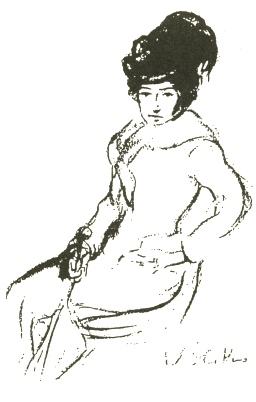 The Wizard of Oz
The Wizard of Oz is one of those books so rich in symbolic possibility that it has been claimed for many a cause. For years it was read as a kind of
political/economic commentary, based on a very clever and convinving essay by
Henry Littlefield in 1964. Though this essay evinces a rich imagination and a nice grasp of symbolic possibility (hence the popularity and longevity of its proposals), most agree that it is a bit wide of the mark. There is no evidence to suggest that
L. Frank Baum, the author of
The Wizard of Oz, was in any way interested in politics or economics. What he was interested in was the new religious movements that were becoming quite popular and influential at the time he was writing. Specifically,
Baum was deeply influenced by
Theosophy and
New Thought, and it was these ideas that were being represented in his wonderful books for children.
I have been reading the book (for the first time) with New Thought philosophy in mind, and the parallels seem obvious, though of course I could be accused of reading meaning into a simple story. But to me
The Wizard of Oz is an obvious parable about human potential, the realisation of innate perfection, and persistence in the journey towards success.
The harmless
munchkins are, in fact, the ultimate negative thinkers. Their small stature is illustrative of their small minds. They see danger all around them, and have hemmed themselves into a world dominated by a wicked witch. When
Dorothy arrives to save them they are grateful, but they still attempt to dissuade her from pursuing her own dreams - they find it impossible to conceive of personal transcendence. In the north, south, east and west they see nothing but danger, and the idea of ever reaching the Emerald City is almost an impossibility. The
munchkins represent the great bulk of the population who, according to
New Thought philosophy, choose to restrict themselves to a cramped existence and live constantly in fear.
The
Emerald City is, of course, the great possibility. In fact, the City is really God. It is all goodness and all perfection, and looms distant in our horizons. There is a clear path to this City, but most choose not to travel it. In fact, they trust the care of this City to the Wizard, who is ultimately exposed as a simple mortal like all of us. He lives within the City, but so can we all. The great City is Emerald, and this is just one example of the great deal of description of colour in the book, which points towards
Baum's interest in colour and its
symbolic meanings. This kind of thing was very popular in Theosophical circles, and someone better versed in this lore would be able to read much more into Baum's use of colour than I can.
Each of
Dorothy's travelling companions is missing an important quality, but of course we soon realise that these limitations are all in their heads. The
Tin Woodman who has no heart is emotional, gentle and compassionate, the
Scarecrow with no brain is resourceful and clever and is the one to come up with all of the solutions, and the
Cowardly Lion is brave and self-sacrificing, constantly coming to the aid of others. These creatures illustrate the self-imposed negative beliefs we all carry about ourselves. Our limitations are self-imposed, and often we are the exemplars of the very qualities we crave. All we need to do is realise it - but of course, we don't, and we imagine that any gains can only be made by difficult journeys to mythical lands and consultation with people we imagine to be much greater and wiser than ourselves. This is all basic
New Thought philosophy rendered beautifully and simply in
Baum's fable.
The
Yellow Brick Road obviously represents the path toward our ultimate goal: that of goodness, perfection; of God. This journey toward the Emerald City is not an easy one - we travel through dark forests and are swept away by wild rivers. But Baum's message is that we must never despair at these diversions - they are to be enjoyed and cherished as part of our story. Not too much, though, as the field of dangerously seductive poppies proves - the path of sensuality is an easy and terrible trap, and we must keep our focus on getting back to the Yellow Brick Road.
Each of the characters represents an element of the human struggle - even Toto who is, according to the Theosophists, representative of a more primitive instinctual knowledge. Baum's characters were representative of the great human spirit and the will to progress. Dorothy's longing to return home is representative of a universal human longing to be united with God, to return to our spiritual birthplace. Our quest to find the City is ultimately a desire to return to ourselves.
It's a beautiful, lyrical little book, and with its great potential for deeper understandings it's no wonder it has become one of the great classics of children's literature, and its imagery entered into the popular imagination. I encourage you to read it for yourself (it is only a short book, and there are some really beautiful versions of it around) and see if you can arrive at some of your own meanings.













